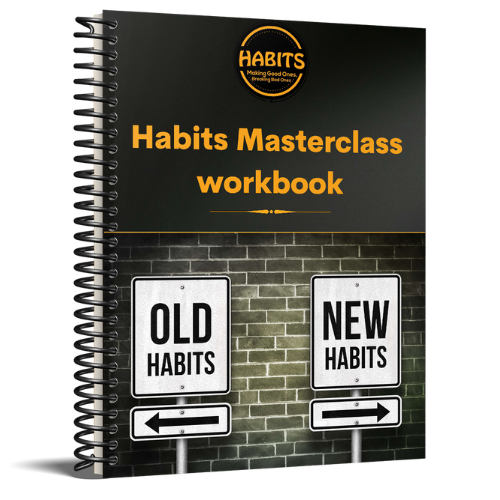
How to Get More Done With Less Willpower
The bank teller yesterday laughed and called me OCD. (Obsessive Compulsive Disorder) She said that because I pulled out my phone, looked at my budget and asked for $232 back in cash. And every week I get the same amount, in exactly the same denominations. All the tellers at my bank know.
I’ve been called (good-naturedly) “nerd” and a bunch of other things. But here’s the thing: I’m not OCD. I’m not that organized in a lot of ways. I’m not really nerd…… OK, I am a little nerdy.
But the truth is: most of what I do is not because I’m a super-organized, pocket-protector guy. In fact, I am rather distractable, and disorganized in a lot of ways. My wife & anyone else close to me knows.
How I discovered the power of systems
 I moved to OKC, became a pastor and had a kid in the course of a year. I felt like my whole life was spent barely “keeping the cheese on the cracker.” It was like wet toilet paper: always falling apart at the wrong moment. I told my wife it felt like I was juggling china plates. (I like metaphors.)
I moved to OKC, became a pastor and had a kid in the course of a year. I felt like my whole life was spent barely “keeping the cheese on the cracker.” It was like wet toilet paper: always falling apart at the wrong moment. I told my wife it felt like I was juggling china plates. (I like metaphors.)
I think I first discovered the power of systems when I organized my folder system on my laptop so I can always find what I want quickly. That stayed in place even through the chaos. I have re-organized it a couple times, but I still use it 11 years later. It felt like the ONE PART of my life that was actually WORKING. I had started to discover the truth spoken by that great guru of personal productivity, Winnie the Pooh:
“Organization is what you do before you do something, so that when you do it, it’s not all mixed up.” – Winnie the Pooh
What Systems Are
Here’s what I mean by a system: A way of organizing information or doing work that is a) written down and b) repeatable.
Here’s what I discovered: Systems uphold and advance values. Systems are the things that make visions become reality.
We’ve all been there: We have a great conversation, read a great book, have a deep time of reflection, go to a great conference — and we connect in that moment with our deepest values. Things that resonate inside us. Then we forget. The notes never get turned into action. The conversation is forgotten in the rush of the “urgent.”
For a while I thought it was because the values weren’t real or intense enough. I thought the problem was motivation… As if I really didn’t hold those values deeply enough. You know the cruel self-talk:
“If I REALLY valued my family, I’d…”
“If I was serious about my health, I ought to…”
“Obviously I just don’t care enough about my prayer life…”
Sometimes, this could be the case. But not always… maybe not even usually. I think it’s because we have a limited supply of willpower and brainpower (I’ll be writing on this in the future!). We can’t wake up every morning and get done the things that tug at our attention, and still create brand-new, never-before-thought-of ways to live out our deepest values! We just don’t have the margin in today’s fast paced world.
What if there was a way that required less thinking, less willpower, less motivation and got better results? What if you could think about it once, create a list, and then set a reminder? What if the mental maintenance on your values dropped by 50%?
I am starting to see this in my life — with systems.
What Systems Can Do
Systems have enabled me to:
- Get dressed faster in the morning
- Accomplish several things I value every single day
- Improve my relationship with my wife
- Start improving my health
- Prepare speeches or sermons faster and more thoroughly
- Raise 7 kids on limited income.
- Eliminate money fights between my wife and I
- Cut forgetfulness in my life in half (haven’t eliminated it yet…)
- Decrease the stress on my limited willpower
- Focus on what matters in the middle of too many options
In Part 2 of this series on systems, I will share a process for How to Create Systems In Your Work and Life.
What about you? What are some benefits you might reap in your life by installing systems?








Dave
Reblogged this on deliberatingdave and commented:
Do you struggle to find the willpower to get things done? Would you like to get more done with less stress?
I think most of us would give the same answers to these questions. If you, like me, find these thoughts appealing, then I wholeheartedly recommend this article for your consideration.
How to Develop Systems in Your Life and Work | darrellstetler2
[…] my first post on systems, I shared the benefits of having systems in your life. Just in case you think you’re […]
How to find the right Tools for Your Systems | darrellstetler2
[…] in this series on systems we’ve discussed why you need systems, and how to develop systems that work for […]
3 Systems That Are Working for Me Right Now (& the Tools I’m Using) | darrellstetler2
[…] this series on Systems in your work and life, I’ve talked about why you need systems, and then a simple plan for how to develop systems, and why you need to work with […]